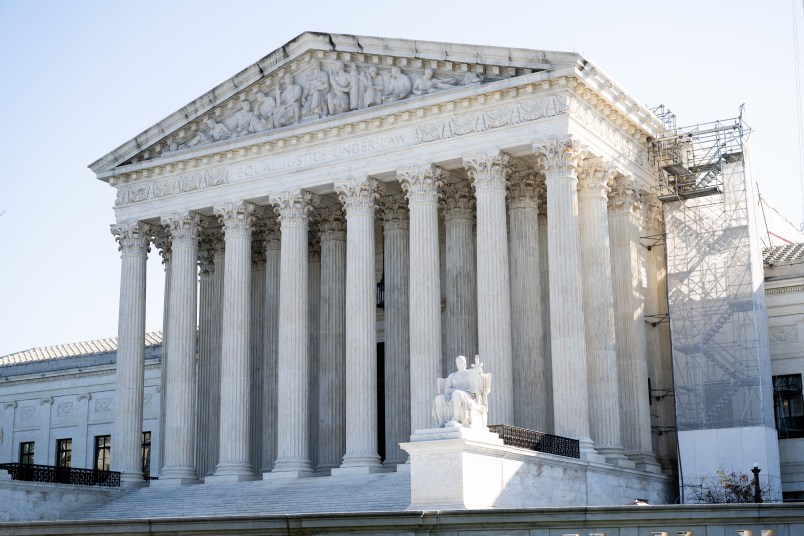In a win for Republicans trying to perpetuate the myth that non-citizens will vote en masse for Democrats, the Supreme Court on Wednesday allowed a voter purge program in Virginia to move forward only days before the presidential election.
The justices blocked a lower court ruling that found the purge program was a direct violation of a National Voter Registration Act provision that, the court found, would prevent the purge so close to the election.
Wednesday’s brief Supreme Court order noted that all three liberal justices dissented.
Although Wednesday’s decision — which allows for the removal of close to 1,600 voters from the voter rolls — is not a ruling on the future of the program, it will likely disenfranchise eligible voters in the state. Experts and the plaintiffs in the suit have argued that the list of roughly 1,600 almost certainly contains people who are citizens, and Virginia officials have not been able to muster evidence to contradict that point.
More broadly, the decision gives breathing room to false Republican talking points that non-citizens are voting en masse on behalf of Democrats this cycle.
Last week, U.S. District Court Judge Patricia Tolliver Giles shut down the new voter purge program, which has been championed by Virginia Governor Glenn Youngkin (R), saying Youngkin’s program violated the NVRA’s 90-day quiet period. The 90-day period prohibits any systematic list maintenance programs from being implemented within 90 days of an election.
A federal Virginia appeals court unanimously upheld that ruling on Sunday, refusing to reimplement the program and restoring the voter registrations of those who may have been erroneously purged.
On Monday, Republican state officials asked the Supreme Court to allow the state to reinstate the program and to follow through on the removal of close to 1,600 voters. Wednesday’s SCOTUS decision means the state is allowed to remove an estimated 1,600 voters from its voter rolls ahead of November 5.
The biggest issue with the program, aside from violating the NVRA, is that it relies on unreliable and incomplete data from the Department of Motor Vehicles. In Virginia, a driver’s license is valid for eight years, which means that it’s possible to obtain a license as a non-citizen, and then, within that eight-year period, become a citizen without ever having to obtain an updated license, as TPM has previously reported. The program, therefore, has the potential to disenfranchise eligible voters by relying on outdated information.
More broadly, non-citizen voting is simply not a real issue in federal elections. Donald Trump and his allies have breathed new life into the myth of non-citizen voting this cycle, manufacturing outrage over the issue as they set themselves up to point to it as a source of voter fraud if they lose next month.
The decision also seems to run afoul of the spirit of the Purcell principle, a guardrail the conservative justices sporadically invoke to prevent changes to voting laws and election administration too close to the election itself. The Court’s majority has shown very little consistency in its application of the principle, often using it to block the drawing of constitutional district maps months before the election.
None of the justices explained his or her reasoning in the order, beyond the liberals noting their dissent. If they had, they may have made the tortured argument that allowing the purge to continue is technically in line with Purcell, and that halting it was the change to voting practices. In reality, though, Purcell is meant to avoid confusing voters and risk disenfranchising them — which this order clearly does, as citizens have been swept up in the purge.
The right-wing justices seem to be telegraphing to states that the safeguard against 11th-hour purges is yet another voter protection that this Court has no interest in enforcing.







“The” Supreme Court didn’t do this. The corrupt Republicans did it. Any more questions? They’re all in on Dump and rule by any means.
And so the SCOTUS reign of error creaks into early life to foster the chaos they hope will bring their rough beast to Bethlehem. At least we know we can’t count on them at all, ever.
They know Trump is losing. This gives them this opportunity to put some small part of their thumbs on the scale, so they seized it.
Also:
Mitigating this: Virginia has same day registration. People wrongly off the rolls can still re-register and vote (with the proper supporting documentation).
Fuckers.